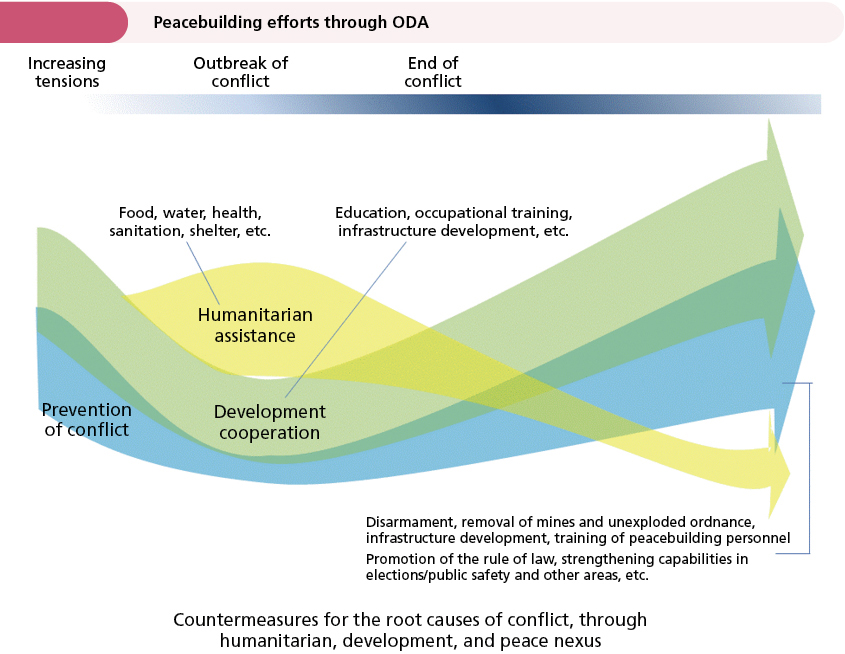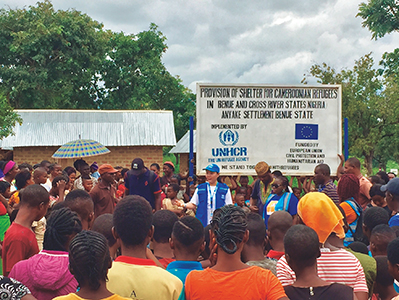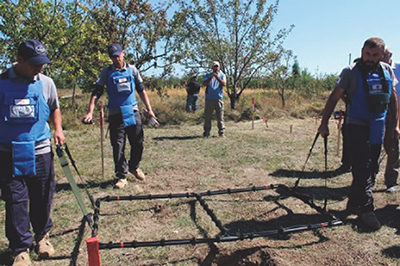2-2 Assistance for Ensuring Peace, Stability, and Security
(1) Support for Peacebuilding and Refugees/Displaced Persons
Regional and internal conflicts arising from various factors, including ethnic, religious, and historical differences, continue to pose challenges for the international community. Such conflicts generate a great number of refugees and displaced persons, resulting in humanitarian crises. These conflicts also undermine the progress in development achieved through long-term efforts, and cause massive economic losses. Therefore, it is important for the entire international community to engage in “peacebuilding” for the establishment of foundations for development in order to prevent conflicts, avoid their recurrence, and consolidate sustainable peace.

●Japan’s Efforts

UNHCR staff holding a discussion with refugees at a Cameroonian refugee camp in Benue State, Nigeria (Photo: UNHCR)
Within the international community, discussions on consistent support from the resolution of conflicts to recovery, reconstruction, and nation-building have been held in fora such as the UN Peacebuilding Commission (PBC)*, which was established in 2005. Japan has served as a member of the PBC Organizational Committee since its establishment, and has been actively contributing to it. As of December 2020, Japan has contributed a total of $55.5 million to the UN Peacebuilding Fund (PBF)*, which was established in 2006, and supports the prevention of conflict recurrence, conflict prevention, and sustaining peace in countries in Africa, Asia, and other areas as the seventh highest major donor. Furthermore, in his statement at the General Debate of the UN General Assembly in 2020, Prime Minister Suga pledged to contribute to sustaining peace, including through a role in the PBC, and engaging in international support in the fields of institution and capacity building.
Moreover, Japan provides support for refugees and displaced persons affected by conflict, food assistance, and electoral assistance for political peace processes, etc. In addition, to promote the consolidation of peace after a conflict is resolved, Japan has assisted in disarmament, demobilization, and reintegration (DDR) of ex-combatants and the rebuilding of the national security sector to ensure the country’s stability and security. Japan also extends support for reconstruction in areas such as the repatriation and resettlement of refugees and displaced persons, and the rebuilding of basic infrastructure (socio-economic infrastructure). Further, in order to consolidate sustainable peace and ensure that conflicts do not reoccur, Japan works to strengthen the administrative, judicial, and policing functions of the target country, while supporting the development of economic infrastructure and institutions, and pursuing efforts in the social sectors of healthcare and education. In such undertakings, Japan is engaged in promoting the participation of women based on the relevant UN Security Council Resolutions on Women, Peace and Security (WPS), which recognizes the importance of the roles of women in peacebuilding. In order to provide such support in a seamless manner, Japan takes an approach that combines assistance through international organizations, grant aid, technical cooperation, and ODA loans.
Furthermore, the Development Cooperation Charter outlines that Japan will strengthen coordination between development cooperation and international peace cooperation activities such as UN peacekeeping operations (PKOs). In the fields where UN PKOs are deployed, many initiatives are underway which contribute to efforts for protecting refugees/displaced persons, women, and children affected by conflict and developing basic infrastructure. To maximize the effects of such efforts, it remains important for Japan to promote such forms of coordination.
In addition, Japan dispatched 172 instructors from the Japan Ground Self-Defense Force (JGSDF) and other government entities to conduct training on the operation of heavy engineering equipment for 277 engineering personnel in eight Note 16 countries in Africa, under the framework of the UN Triangular Partnership Project, where three parties, namely the UN, Supporting Member States, and Troop Contributing Countries, cooperate to enhance the capacity of uniformed personnel to be dispatched to PKO missions through provision of training and equipment. This project expanded its scope to Asia and its surrounding regions. Japan dispatched 68 JGSDF personnel and government officials to train 56 engineering personnel from nine Note 17 Asian countries at the trial training in 2018 and the full trainings in 2019 and 2020 convened in Viet Nam. Furthermore, in the fields where PKOs are deployed, the lives of many personnel are lost within the hour it takes before they are taken over by medical workers after injury. In response to this, in October 2019, Japan started life-saving training in the field of medical care.
... Support for Refugees and Displaced Persons
Given the situations in Syria, Myanmar, and other countries, the number of forcibly displaced populations including refugees and displaced persons worldwide at the end of 2019 reached its highest level since the end of World War II, and humanitarian situations are becoming increasingly severe. From the viewpoint of human security, Japan has been providing humanitarian assistance, including assistance for refugees, displaced persons, and others, in order to ensure the life, dignity, and security of the people in the most vulnerable positions and to support the realization of self-reliant development, wherein each person will be able to get back on their own feet.
In particular, Japan works with international organizations, including the United Nations High Commissioner for Refugees (UNHCR) and the International Organization for Migration (IOM) to provide refugees, displaced persons, and others around the world with assistance by distributing shelter, food, and basic supplies necessary to live. Furthermore, through cooperation with the World Food Programme (WFP), the United Nations Relief and Works Agency for Palestine Refugees in the Near East (UNRWA), the International Committee of the Red Cross (ICRC), and other international organizations, Japan has been providing assistance for refugees, displaced persons, and others, even in areas with security concerns by utilizing their expertise and delivering capabilities. In 2020, under the spread of COVID-19, Japan provided a total of $140 million in emergency aid for these international organizations (see Part I for COVID-19 Pandemic and Japan’s Efforts).
Upon providing this kind of assistance for refugees, displaced persons, and others through international organizations, Japan places importance on visible cooperation through collaboration with Japanese entities such as JICA, Japan’s development cooperation implementing agency, as well as NGOs and private companies. For example, in the case of refugee assistance by UNHCR, UNHCR works in collaboration with JICA to implement a program combining emergency and reconstruction assistance. In addition, Japan Platform (JPF), an emergency humanitarian aid organization established in 2000 in cooperation with NGOs, the Government, and the business communities, has been providing assistance for refugees, displaced persons, and others (see also page 145, “B. Cooperation with Japanese NGOs”).
Japan has also been promoting “development cooperation” to help countries to stand on their own from the medium to long-term perspective, in parallel with urgently required “humanitarian assistance,” from the initial phases after a humanitarian crisis arises (humanitarian-development nexus). This is extremely important for preventing refugees, displaced persons, and others from descending once again into a situation that will require humanitarian support. Furthermore, in preventing the occurrence and recurrence of conflict, which is a root cause of humanitarian crises, it is important to provide support for nation-building and social stabilization through peacetime with a medium to long-term view and support self-reliant development. In order to realize this, Japan places importance on the idea of “humanitarian, development, and peace nexus,” and is seamlessly extending support for peacebuilding and the prevention of the recurrence of conflicts and support for poverty reduction and economic development in countries and regions where humanitarian crises have arisen due to the conflicts.
Going forward, Japan will continue to provide support in order to improve humanitarian situations and to create an environment conducive to the safe, voluntary, and dignified repatriation of displaced persons (see “Stories from the Field” regarding support for Venezuelan refugees, and “Support for Southeast Asia” regarding humanitarian assistance for displaced persons from Rakhine State, Myanmar).
... Protection and Participation of the Socially Vulnerable
Although socially vulnerable people including persons with disabilities caused by conflict or landmines, orphans, widows, ex-combatants including child soldiers, and displaced persons are susceptible to the impact of a conflict, the reality remains that assistance for them is delayed in post-conflict recovery and they have difficulty accessing the benefits of peace and reconstruction.
From this perspective, the Government of Japan supported a project implemented by the Japanese NGO Terra Renaissance to enhance the self-reliance of displaced persons and others and thus promote regional stability and social development through providing job training and equipment to refugees from South Sudan and residents of the host community in Adjumani District, Uganda. Furthermore, for the social reintegration of child soldiers and protection and empowerment of children, who are the most vulnerable in conflict-affected areas, Japan has been providing support through UNICEF. For example, in the Central African Republic, Japan provides support for the social reintegration of former child soldiers and comprehensive humanitarian assistance to children who were victims of sexual violence and internally displaced persons through UNICEF. Additionally, in cooperation with UN Women, Japan supports infrastructure development and provides vocational training to ensure sustainable means of livelihood for women and girls living under conflict and natural disaster in Cameroon and Nigeria.
... Reconstruction of Social and Human Capital
Japan supports the reconstruction of social capital and restoration of human capital who participate in economic activities in the countries affected by conflict. This support is aimed at preventing new conflicts from emerging and eliminating factors that could cause conflicts in the course of reconstruction or nation-building.
In regards to the reconstruction of social capital, Japan is putting particular effort in the following five areas: (i) development of social infrastructure, (ii) development of transportation, power grids, and telecommunications networks, (iii) improvement of health and medical system functions, (iv) improvement of education system functions, and (v) food security. As for the restoration of human capital, while combining these areas of assistance aimed at medium to long-term economic development as much as possible, Japan seeks to help develop an economic environment as well as improve livelihoods and increase job opportunities with a focus on preventing social instability caused by rising unemployment and other factors.
... Actions Against Antipersonnel Landmines, Unexploded Ordnance, and Illicit Small Arms and Light Weapons

An exercise as part of explosive remnants of war and mine clearance activities in Georgia through Grant Assistance for Grass-Roots Human Security Projects
In post-conflict countries and regions, antipersonnel landmines and unexploded ordnance (UXO) remain, and illicit small arms and light weapons are still widely in circulation. These weapons not only harm civilians indiscriminately and hinder reconstruction and development activities, but may also exacerbate conflict. It is important to continue cooperation to ensure security and stabilize these countries and regions through assistance for the disposal of antipersonnel landmines and UXOs, appropriate management of small arms and light weapons, and support and capacity building for landmine victims.
As a state party to the “Convention on the Prohibition of the Use, Stockpiling, Production and Transfer of Anti-Personnel Mines and on Their Destruction” and the “Convention on Cluster Munitions,” Japan is steadily implementing international cooperation activities through preventive efforts such as risk reduction education, in addition to mine clearance and victim assistance, from the perspective of the humanitarian, development, and peace nexus. For example, Japan has supported the Cambodian Mine Action Centre (CMAC) not only in terms of equipment provision, but also in establishing a curriculum and building the foundations for training in landmine clearance. CMAC staff who have taken the training are engaged in efforts to spread the technical expertise on landmine clearance throughout Cambodia and abroad. Furthermore, this support has resulted in realizing South-South cooperation, in which CMAC has been functioning as a training center for mine-action staff from other countries, such as Colombia, though the activities in 2020 were hindered by the COVID-19 pandemic.
In Afghanistan, the Association for Aid and Relief, Japan (AAR Japan), a Japanese NGO, has been implementing a project to raise awareness on the risks of landmines, UXOs, and other remnants of conflict, and on the appropriate ways of avoiding them. Since FY2009, through the Grant Assistance for Japanese NGO Projects and JPF, AAR Japan has been conducting Mine Risk Education (MRE) in the country including through the development of educational materials and by conducting training seminars while training local residents to conduct MRE by themselves. Through these activities, MRE has been steadily expanding its reach.
Furthermore, in Laos, which has been particularly affected by UXOs, Japan has dispatched UXO experts, provided equipment, and promoted South-South cooperation. Specifically, Japan has supported the capacity building of organizations that dispose of UXOs, including through introducing mechanical bush-cutters needed for UXO disposal, providing other related materials and equipment, and supporting human resources development in the Provinces of Sekong, Salavan, and Champasak, all of which are poor regions in the country that have endured especially great suffering from UXOs.
In addition to providing bilateral support, Japan is proactively engaged in measures against mines and UXOs through international organizations. In 2019, Japan conducted clearance and risk education against landmines and UXOs through the United Nations Mine Action Service (UNMAS) in Afghanistan, Iraq, Nigeria, Palestine, Somalia, South Sudan, Sudan, and Syria. Moreover, in collaboration with UNDP, Japan has supported the Center for Humanitarian Demining Training in Benin (CPADD) in strengthening landmine disposal training capacity for Central and West African countries. Likewise, Japan has provided support for mine risk education in Chad, Iraq, Palestine, South Sudan, the Central African Republic, Ukraine, and Yemen via UNICEF since 2015. It is also supporting measures against landmines and UXOs (risk reduction education, etc.) in countries and regions such as Palestine, Syria, and Yemen through ICRC.
Japan also provides support for the collection, disposal, and stockpile management of small arms and light weapons. Furthermore, with a view to security improvement, as well as strengthening the import and export management of arms and the enforcement capacity, Japan supports the development of relevant legal systems, capacity building of customs agencies, police forces, and other law enforcement agencies among other initiatives.
... Human Resources Development for Peacebuilding
Activities required in the field of peace building and qualities needed for those engaged in such activities have become increasingly diversified and complex. In 2007 Japan began the Program for Human Resource Development for Peacebuilding, which aimed at cultivating Japanese and other countries’ civilian specialists who could make a significant contribution on the ground. In FY2015, the program was renewed as the Program for Global Human Resource Development for Peacebuilding and Development Note 18, and its content has been expanded to include the “Mid-Career Course,” which supports the career advancement of those with a certain degree of practical experience in fields related to peacebuilding and development, in addition to the existing “Primary Course,” which offers training in Japan to acquire the knowledge and skills necessary on the ground and on-the-job training at field offices of international organizations. Many graduates of these courses are currently playing an active role in the fields of peacebuilding and development in regions such as Asia and Africa.
- *UN Peacebuilding Commission (PBC)
- A UN organization established in March 2005. Based on the recognition that it is extremely important to provide appropriate post-conflict support due to the frequent recurrence of regional conflicts and civil wars after they end, the PBC aims to provide advice regarding consistent support from conflict resolution to recovery, rehabilitation, and reconstruction.
- *UN Peacebuilding Fund (PBF)
- A fund established in October 2006. The fund is used to respond to urgent threats to peace processes, support peace agreements and political dialogue, and strengthen national organizations and national capacity, as well as revitalize economies and establish administrative services, among other purposes.
- Note 16: The eight countries are Uganda, Kenya, Tanzania, Rwanda, Burundi, Ghana, Sierra Leone, and Nigeria.
- Note 17: The nine countries are Viet Nam, Indonesia, Cambodia, Singapore, Nepal, Timor-Leste, Fiji, Bhutan, and Myanmar.
- Note 18: Program for Global Human Resource Development for Peacebuilding and Development: https://www.mofa.go.jp/mofaj/gaiko/peace_b/j_ikusei_shokai.html (in Japanese only)
